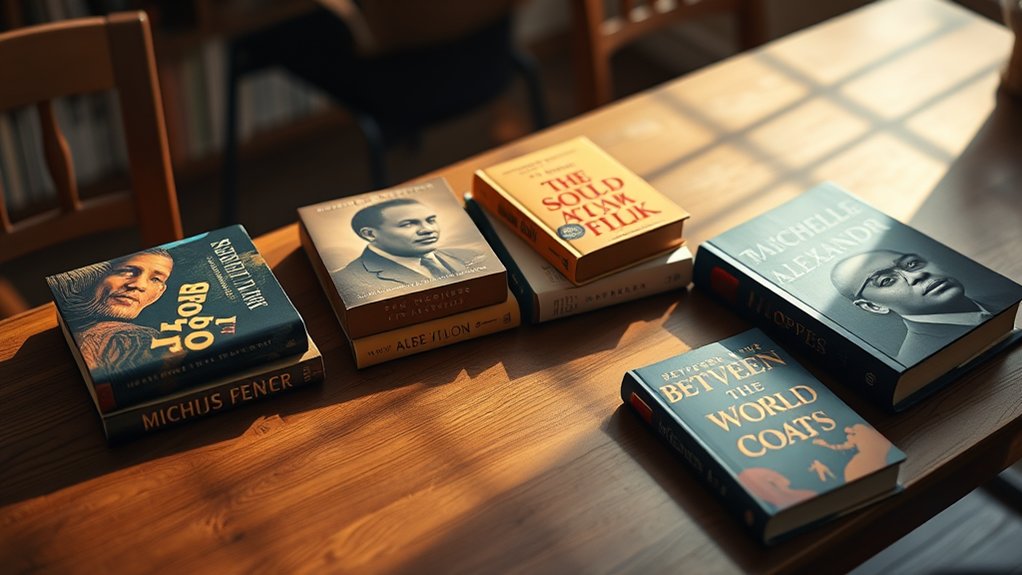Books That Illuminate Race and Identity
- Books on race and identity are not merely historical accounts; they offer real stories and insights that can transform perspectives.
- Works like "The Souls of Black Folk" and "Between the World and Me" delve into personal narratives linked to broader societal issues.
- These books highlight racial identity and question societal norms, inspiring potential positive change in personal and community contexts.
Interested in learning how these stories might inspire positive change in your life and community?
There's much more to uncover!
Racial Identity and Society
When you explore racial identity, you step into a world where who you're meets what society defines you to be. Racial identity is a vital part of your self-concept, shaped by societal norms that affect how you view yourself and others. For many Black Americans, it's tied to feelings of belonging and social connections both in and out of their communities. Strong racial identity can act as a shield against discrimination but may also leave you vulnerable in less accepting environments. It plays a role in shaping your perspectives on racial inequality, social acceptance, and psychological well-being. As you traverse mainly White spaces, awareness and pride in your racial identity can guide your social and political alignments, empowering community dialogue and growth. Understanding the economic discipline needed for community empowerment can help foster the development of independently owned institutions. Mobilizing grassroots efforts in underrepresented communities can amplify diverse voices and create systemic change. Medical student acceptance is crucial, as it may mediate the relationship between discrimination and well-being in academic settings, especially for African American students.
Systemic Racism and Injustice
Systemic racism is like an unseen web woven tightly into the fabric of society, impacting everything from where you can live to how your community is policed. You'll find systemic inequality influencing health and wealth, limiting economic opportunities for people of color. Residential segregation means you're likely paying more for less, with systemic inequality built right into the housing market. Racial disparities persist in education too; schools rely on local property taxes, leaving many students without the resources they need. Voter suppression steals your voice, while biased policing and harsh sentencing widen the gap of injustice. Modern tactics reflect a continuation of historical voter suppression methods, creating obstacles for Black and Brown communities at the polls. Books like "The Souls of Black Folk" and "White Fragility" illuminate these issues, offering insights and cultivating understanding to battle these challenges.
Sociological Insights Into Race
Race isn't just about skin color or ancestry; it's a social construct that varies across cultures and societies. You'll find that racial appraisals are judgments shaped by cultural contexts, history, and personal experiences. It's fascinating how racial identities aren't fixed but shift over time and place. Understanding this helps in recognizing the complexities of self-identification and identity formation.
| Aspect | Description |
|---|---|
| Racial Appraisals | Shaped by culture, history, appearance |
| Cultural Contexts | Influence identity and societal perception |
| Identity Formation | Varies with self-view and community input |
Racial narratives are heavily influenced by past experiences. They determine how people see and label themselves, like choosing between "Black" and "African American." As you explore these insights, you'll see how literature challenges or affirms these social constructs.
Intersectional Perspectives and Liberation
Imagine a world where everyone's unique experiences and identities are seen and valued. Intersectional liberation seeks to create such a world by focusing on how various identity markers like race, gender, and class intersect in our lives. Kimberlé Crenshaw's groundbreaking work introduced this idea, changing the narrative on social justice.
Intersectionality helps identify complex challenges faced by marginalized groups and informs the creation of more inclusive policies.
In literature, authors like Toni Morrison and David Mura offer intersectional perspectives, reshaping how characters are portrayed and challenging stereotypes. You find diverse protagonists bringing narrative transformation and authentic representation.
This approach isn't just about storytelling but about empowering communities by highlighting interconnected struggles, leading to understanding and liberation for all.
Intersectionality guides conversations toward meaningful change.
Personal Narratives of Race and Identity
Everyone's story contributes to the complex tapestry of race and identity, inviting you to explore the rich and often challenging narratives that come with it.
Memoir analysis opens doors to personal insights, allowing you to experience journeys like Debby Irving's *Waking Up White* firsthand. These stories unpack the layers of identity exploration, revealing deep truths about privilege and systemic racism highlighted in Tim Wise's *White Like Me*.
Books like Ta-Nehisi Coates' *Between the World and Me* tackle historical context, offering you a lens to see how personal and societal narratives intertwine.
As you engage with these personal experiences, you're empowered to grasp how personal and public histories shape identity. Seize this opportunity to reflect on your own journey, promoting understanding and change.
Conclusion
Turning Pages, Changing Lives
You've journeyed through stories where personal narratives intertwine with history, offering you a deeper understanding of race and identity. These books serve as beacons, illuminating paths to wisdom and empathy, challenging you to view the world in vibrant colors. As you engage with these stories, you're not just reading; you're actively contributing to a powerful wave of change. Let these insights ripple through your conversations, empowering communities and helping shape a better tomorrow. So, what will your next page-turner be? Dive in, and let's transform the narrative together.










